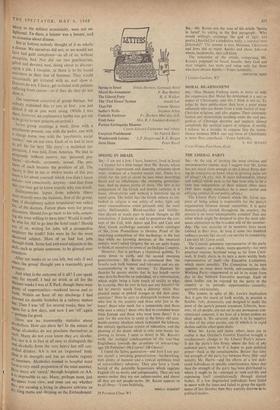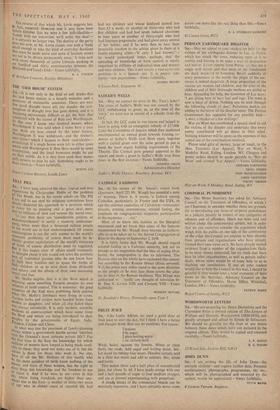THE LIBERAL PARTY
SIR.--At the risk of inviting the most obvious and unconstructive riposte, maY I suggest that Mr. Levin has not stood close enough to the Liberal Party dur- ing its resurgence to know what its growing pains are all about? (A pity, this. If more independent, liberal and radical minds such as his had been able to be a little less independent of their natural allies since 1945 there might nowadays be a more useful and edifying conduct of our public affairs.)
The Liberal Party Council which Mr. Levin sus- pects of being asleep is responsible for the party's organiSation between annual assemblies. It is quite democratically elected throughout the country; the process is no more 'unimaginably complex' than any other which might be designed to give the most ade- quate expression to the broadest will of the member- ship. The vast majority of its members have never lobbied in their lives. At least if some two hundred ordinary people like myself can survive its complexity I am Sure Mr. Levin could.
The Council. genuinely representative of the party in the country as a whole, meets quarterly—for very practical reasons, Scotland being so far from Corn- wall. It freely elects in its turn a more wieldy body representative of itself—the Executive Committee, which meets monthly. The _Committee in its turn appoints an -even more wieldy sub-committee--the Working Party—empowered to act in its name from day to day between Executive meetings. Each of these bodies can be rejected by the party in the country at its periodic opportunities—annually, quarterly and monthly.
This system, in spite of Mr. Levin's implication that it gets the worst of both worlds, in practice is flexible, fully democratic and designed to make the most of the party's present resources. Liberals, how- ever, of all people, are not set in any permanent con- stitutional concrete; if we hear of a better system we shall adopt it. We certainly claim it to be superior to that of the other parties, one of which is in rapid decline and the other quite static.
What Mr. Levin and many others have yet to realise is that October's General Election -brought a revolutionary change to the Liberal Party's nature. It put the party's feet firmly where the feet of any national party must be if it hopes to gain political power—back in the constituencies. Before that time the strength of the pgrty lay between Party HQ—and notably Mr. Harris—and the efforts of a few dedi- cated individuals in specific constituencies. Since that time the strength of the party has been distributed to where it ought to be—amongst its rank-and-file and expressing itself constitutionally through elected bodies. If a few disgruntled individuals have failed to move with the times and failed to grasp the signifi- cance of last October then they scarcely deserve to be political leaders. THE SPECTATOR, MAY 6, 1960 El fact, occurred. However true it may have been Shetlands and Land's End.—Yours faithfully,
before October that we were a few individualists— it is certainly no longer true. The destiny of the party does not now, as Mr. Levin claims, rest with a 'body small enough to take the kind of everyday decisions that must be made more and more if hesitant voters are not to be driven permanently away.' It rests now six hundred and thirty constituencies between. the
Lunch with me tomorrow; we'll settle this then'— 111) many thousands of active Liberals working in The reverse of that which Mr. Levin suggests has, 87 B m rixha Crescent, Ruislip. Middlesex







































 Previous page
Previous page